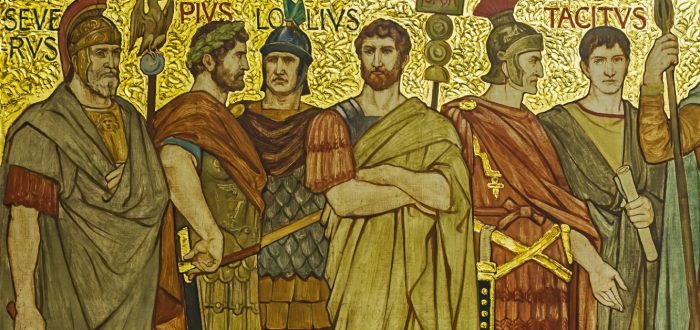Our History Lecturer, Dr Allan Kennedy, provides an overview of the Roman attempt to subjugate Scotland towards the end of the 1st century CE. This article first appeared as part of the ’10 Minutes On…’ column in History Scotland magazine, with whose kind permission it is republished here.
Julius Caesar was the first Roman commander to set foot on British soil. But any expectation that his brief stay in 55 BCE, or his longer campaign the following year, would herald an imminent Roman conquest of Britain proved unfounded; it would not be until the reign of Claudius (r. 41-54 CE) that the process of subduing and annexing Britain really began, and it would take until nearly the end of the century to complete.

In this context, however, Britain – ‘Britannia’ in Latin – means ‘England and Wales’. Scotland had not been subdued. Between 80 CE and 84 CE, one man set out to change that: Gnaeus Julius Agricola. Appointed governor of Britannia by the Emperor Vespasian (left), Agricola arrived in his province in 78 CE and immediately set about expanding Roman frontiers, first by subduing much of Wales and then by defeating the Brigantes, a people residing in northern England. He then turned his attentions still further northwards, to the mysterious wilds of Scotland.
We know about Agricola’s activities though the contemporary account of them written by the Roman historian Tacitus. But Tacitus was also Agricola’s son-in-law, meaning that his narrative has to be treated with some caution. Nonetheless, it is all we have, and even taken with large doses of salt it does at least allow us to reconstruct the broad outline of Agricola’s campaign.
Agricola began in 80 CE by marching into the area between the modern Borders and the Firth of Forth, whose tribes had been encountered but not pacified by previous Roman commanders. He completed their subjugation and then spent at least two years consolidating his gains until, in 83 CE, he was ready to cross the Forth-Clyde line with 25,000 men to confront, for the first time, the peoples of Caledonia.
Today, we tend to use the word ‘Caledonia’ to refer to the whole of Scotland. For the Romans, however, it had a more restricted meaning, since it referred only to the territories of a large tribal confederation – the Caledonii – whose lands occupied much of the central Highlands and the north-east. As Agricola traversed Caledonia, advancing along the eastern Highlands, the Caledonii continually harassed him with a determined campaign of guerrilla resistance. The Romans hated this form of warfare, not least because it was virtually impossible to defeat, and Agricola longed for a full-scale pitched battle to settle things once and for all. In 84 CE, the Caledonii obliged.
Quite why they chose to change their tactics in unclear. What is certain, however, is that a huge Caledonian force mustered to counter the Roman invaders, offering battle at a site named by Tacitus as ‘Mons Graupius’. The location of this battlefield is unknown, with multiple candidates in Perthshire and Aberdeenshire having been advanced. But wherever it took place, the battle of Mons Graupius resulted in a crushing Roman victory, at least according to Tacitus:
[The Caledonians’] repulse and rout was as severe as their onset had been furious … Our men pursued, wounded, made prisoners of the fugitives only to slaughter them when others fell in their way. And now the enemy, as prompted by their various dispositions, fled in whole battalions … About 10,000 of the enemy were slain; on our side there fell 360 men.
Mons Graupius was a great victory, but Agricola could not capitalise on it. The wildness of the Scottish landscape, combined with the onset of wintery weather, forced him to retire to quarters in the south. Shortly thereafter, he was recalled to Rome by the Emperor Domition, who was allegedly jealous of his success. In the decades that followed, Roman power steadily retreated in the face of fresh tribal hostility. The construction of Hadrian’s great wall between the Solway and the Tyne in the 120s CE served only to underline what had already been apparent in 84 CE: Rome had not subdued Caledonia, and it never would.
Further reading
J.E. Fraser, The Roman Conquest of Scotland: The Battle of Mons Graupius AD 84 (Stroud, 2005)


Comments are closed.